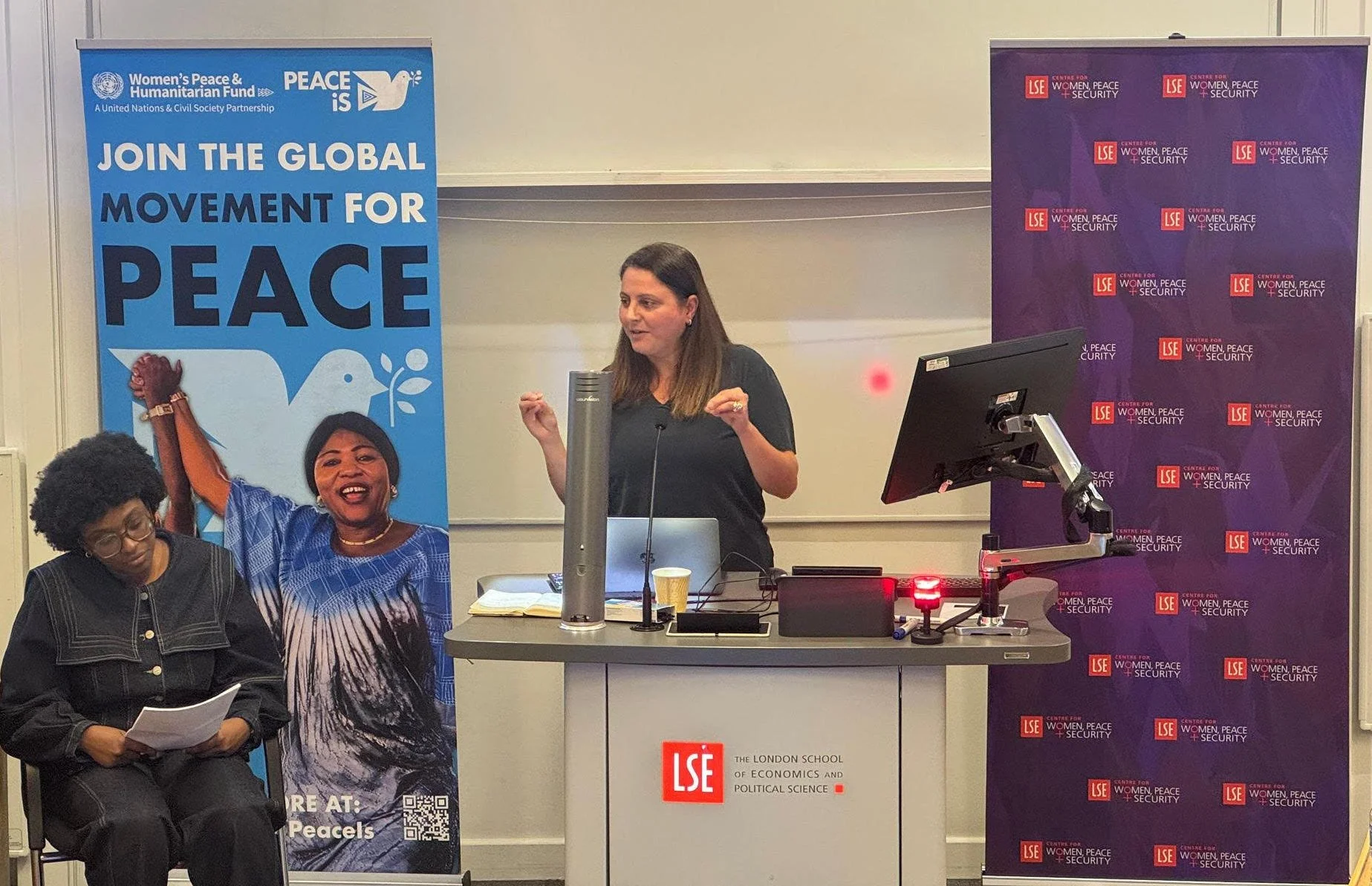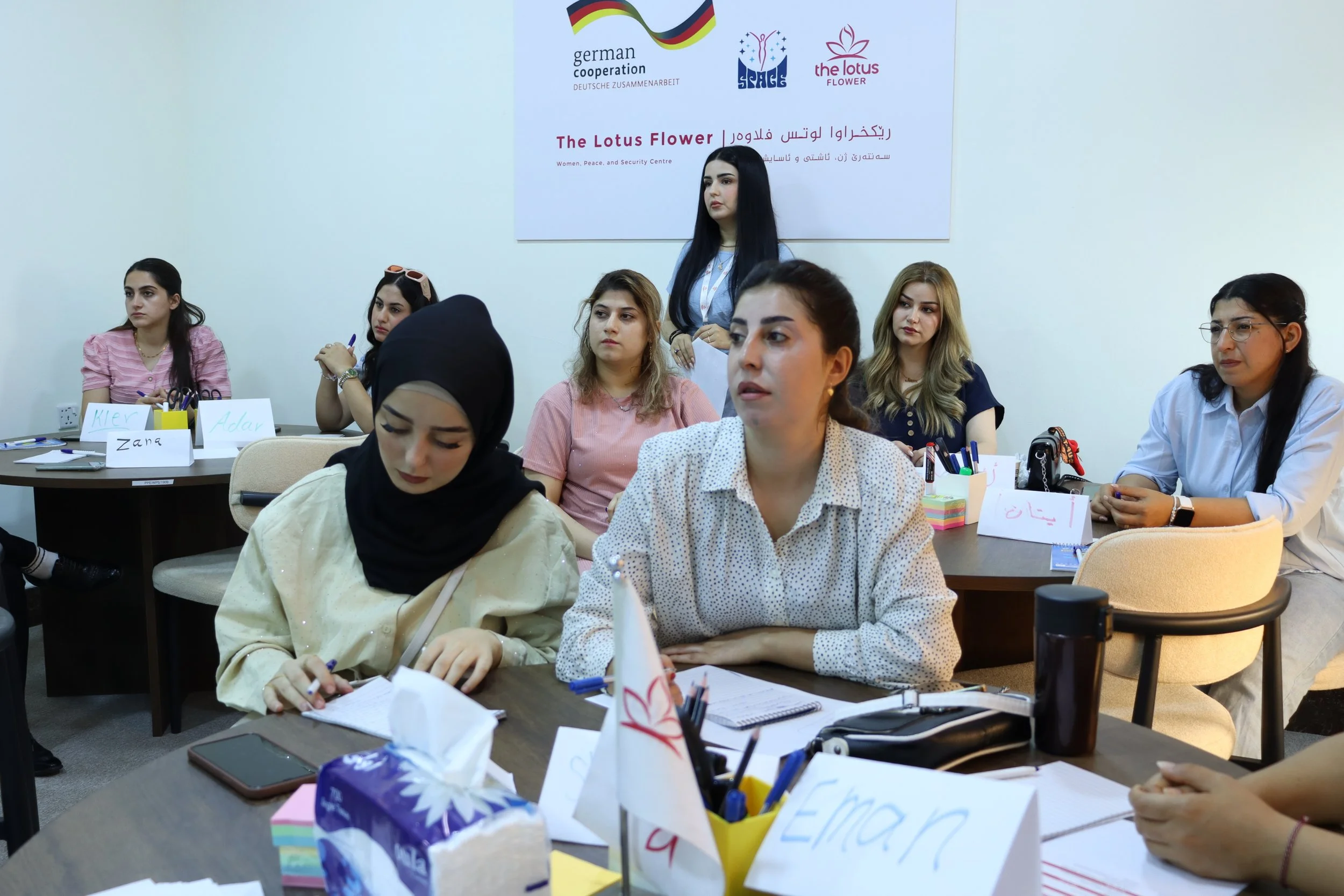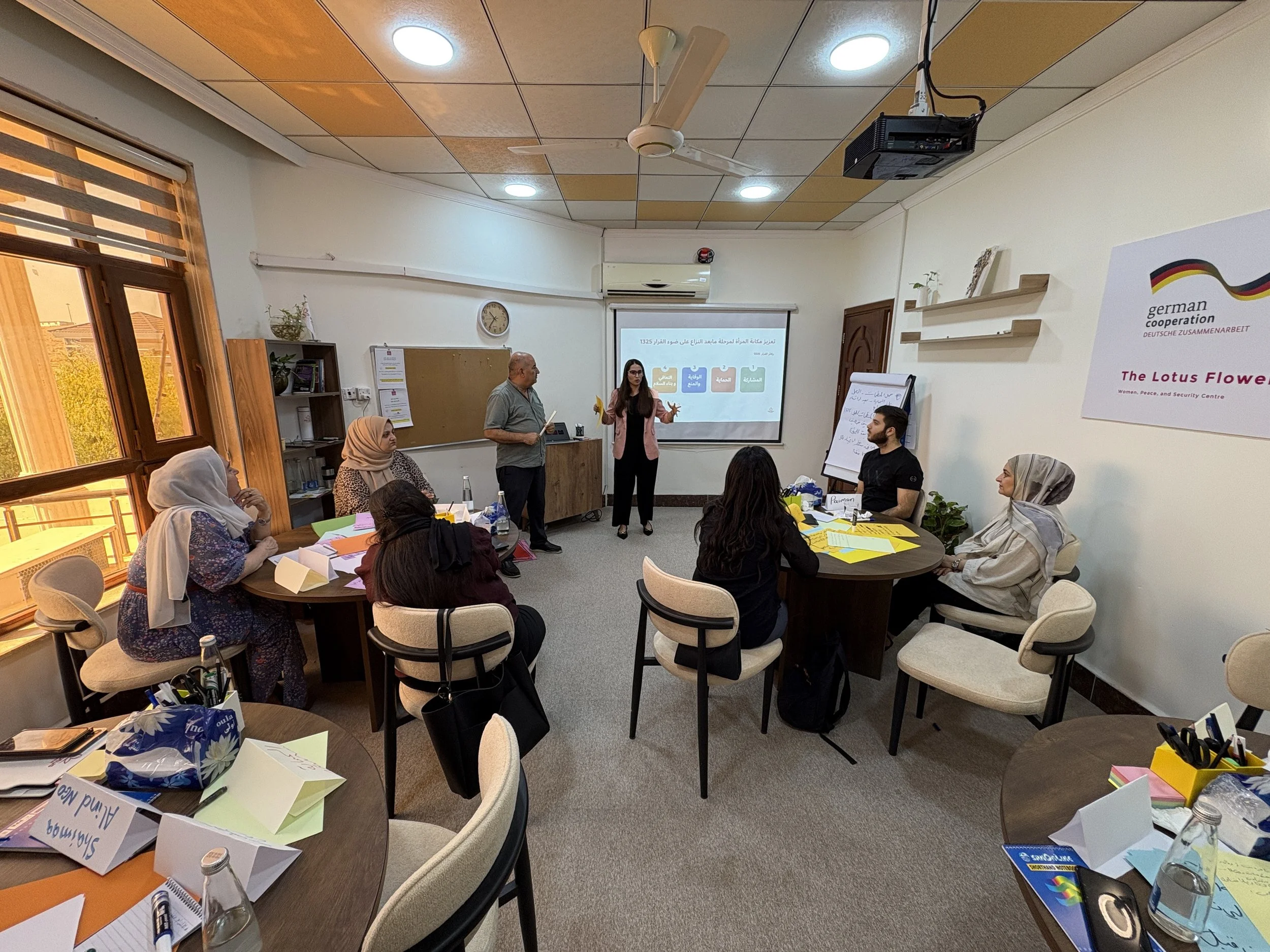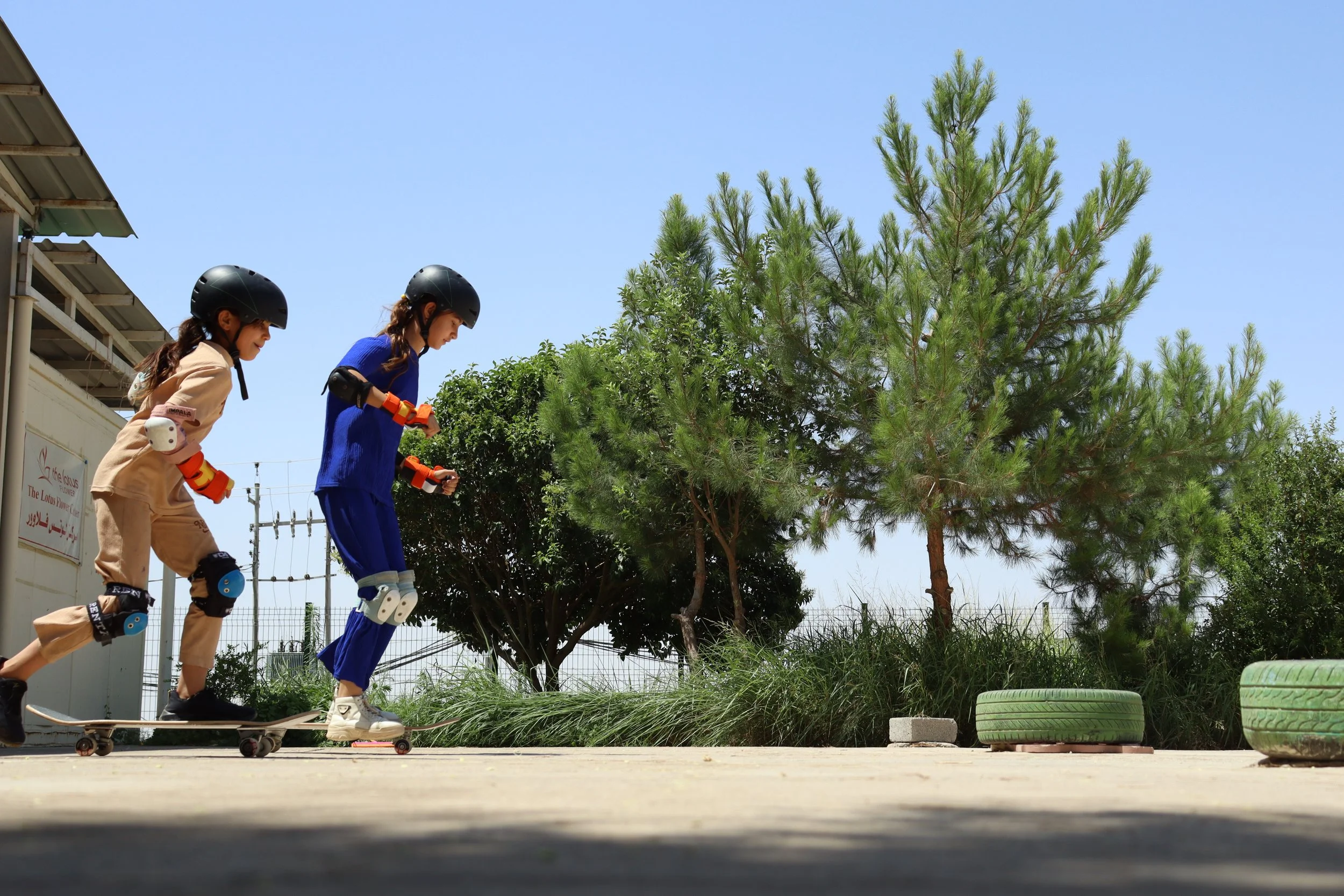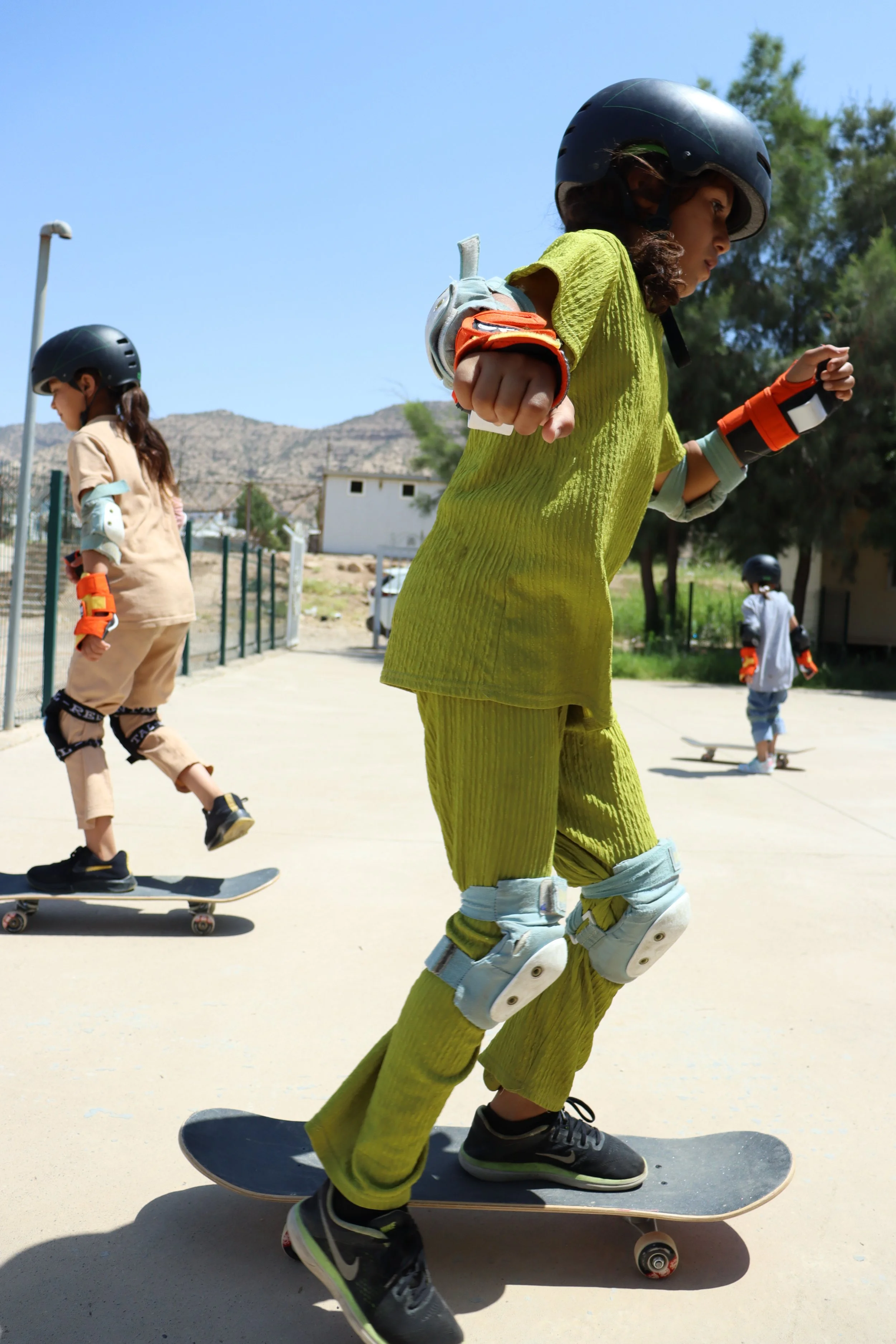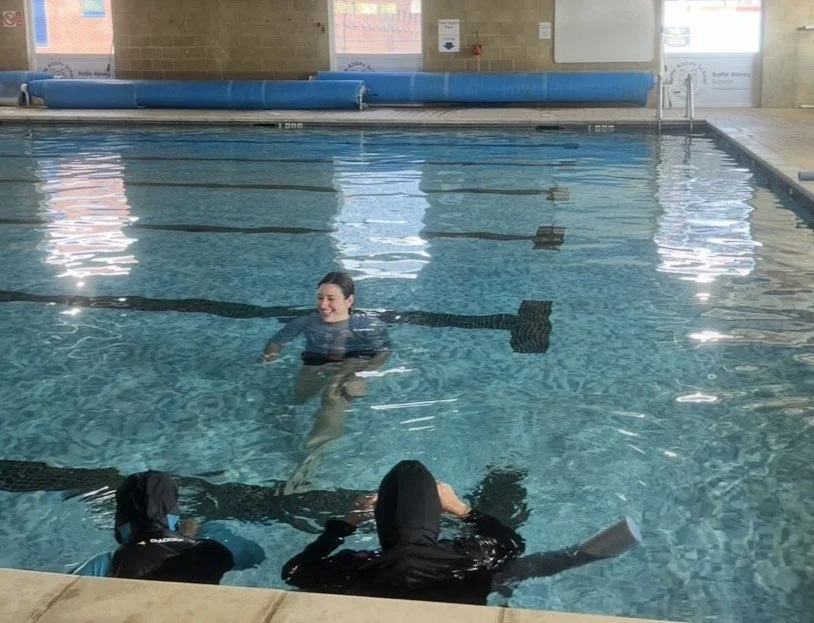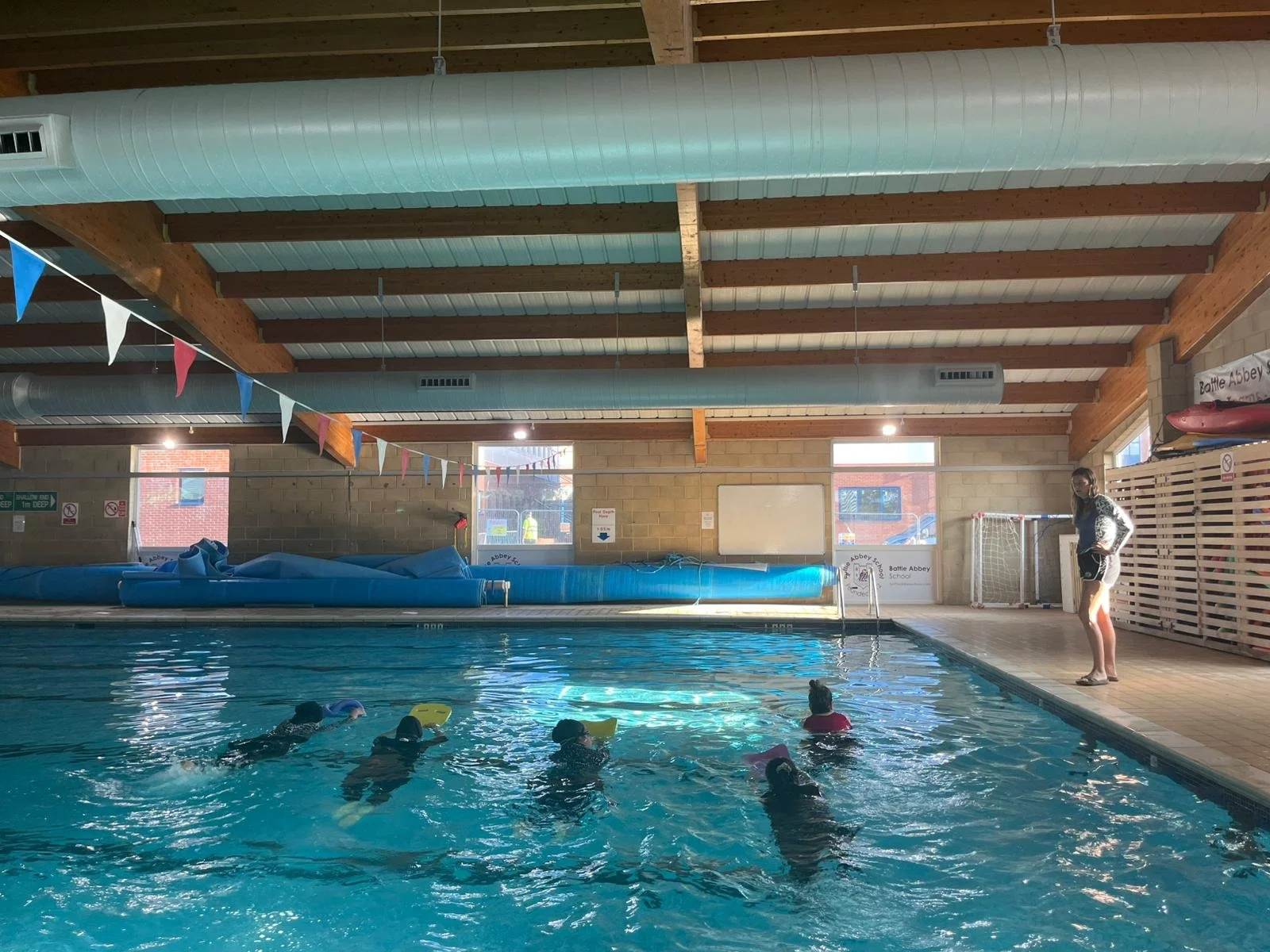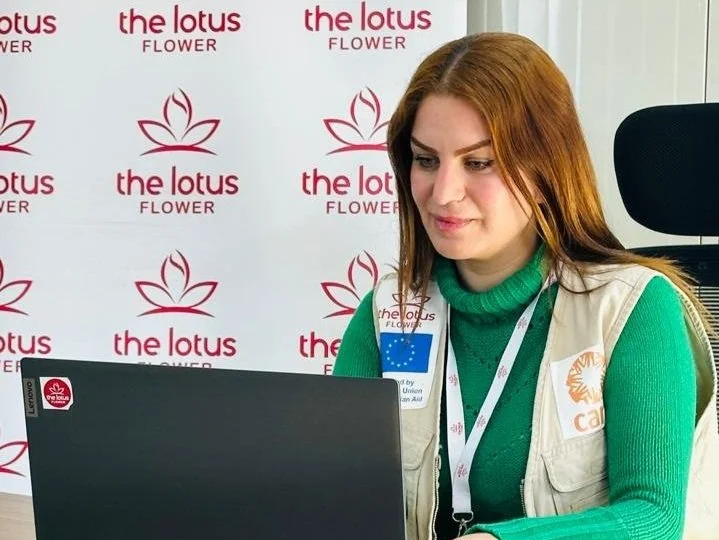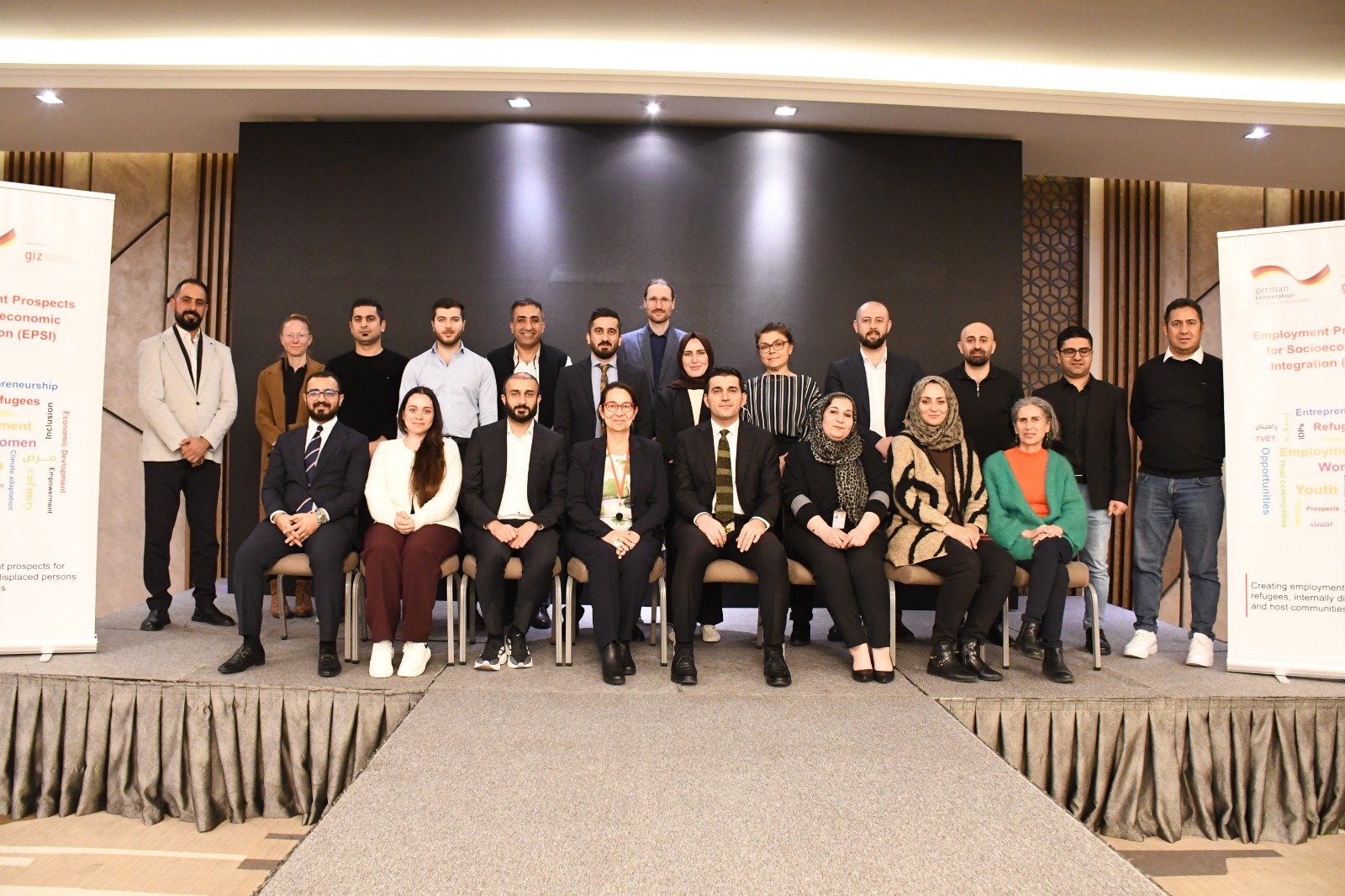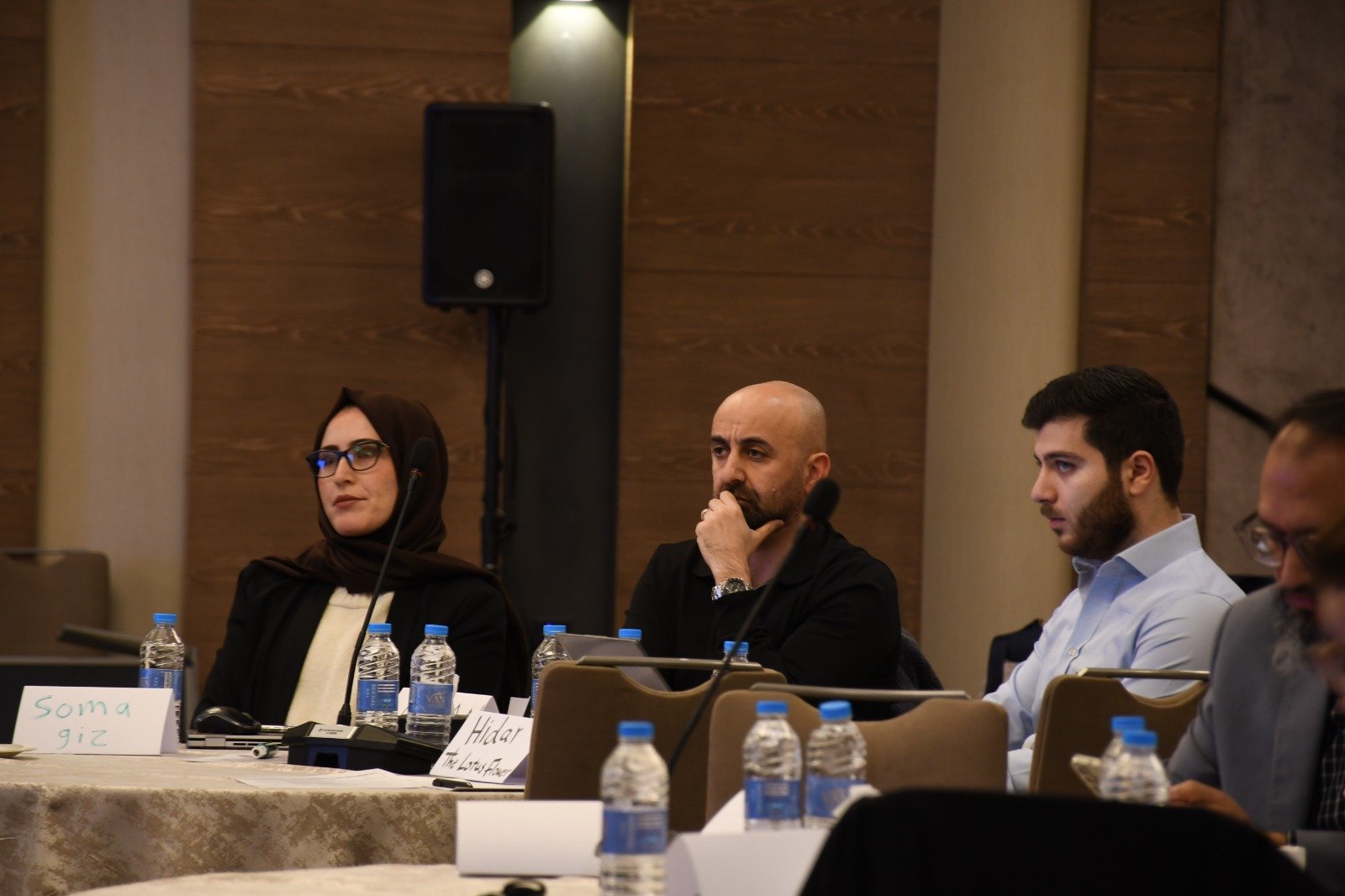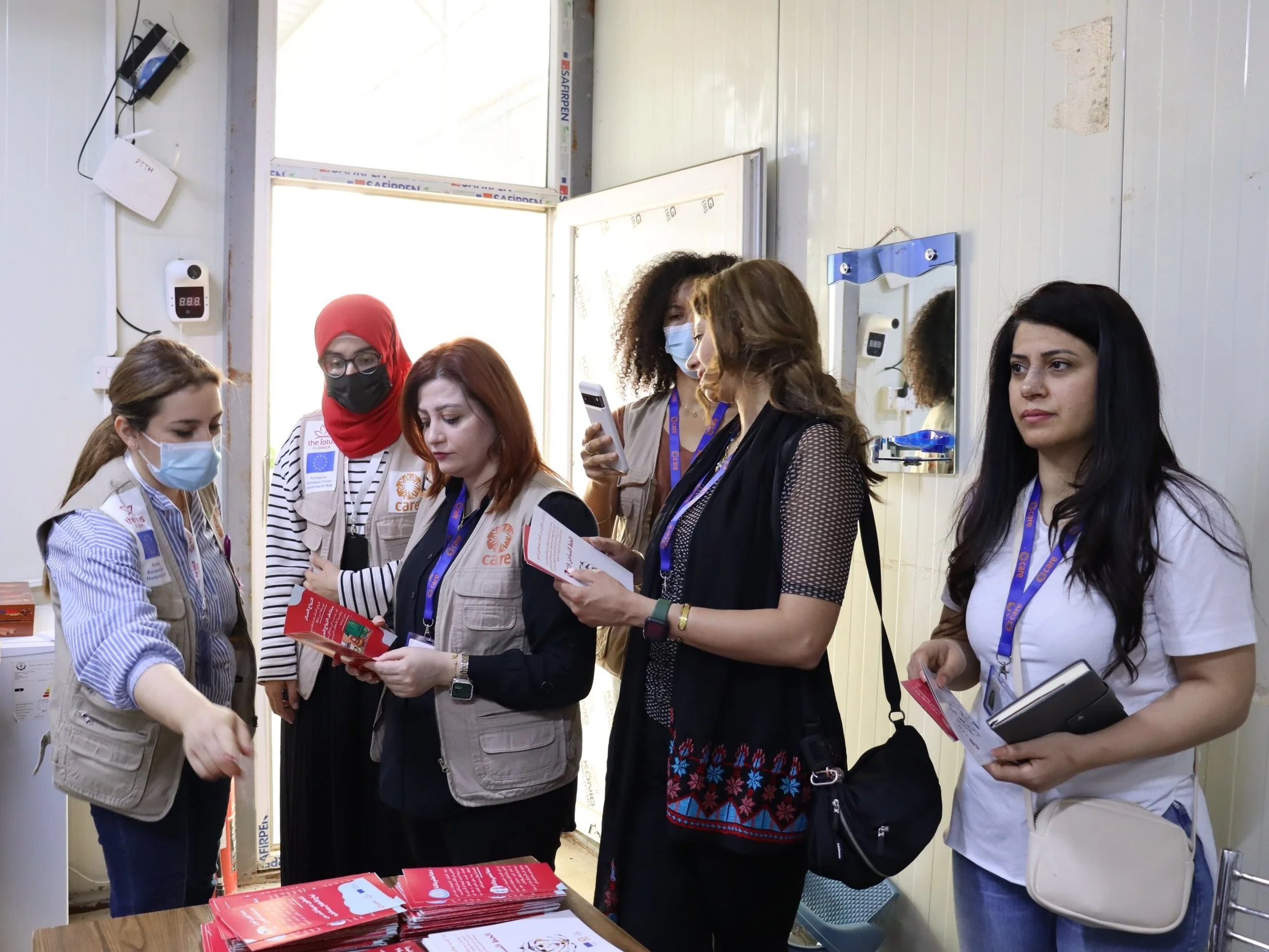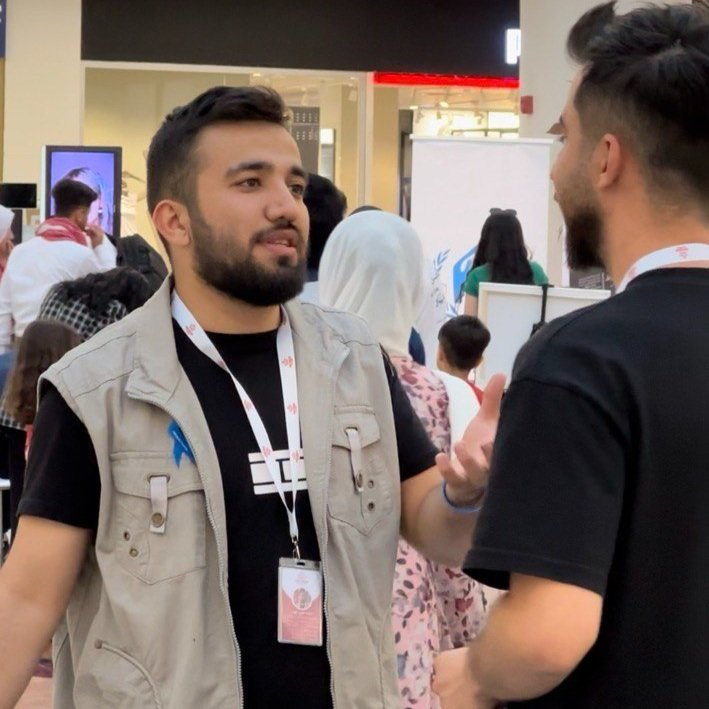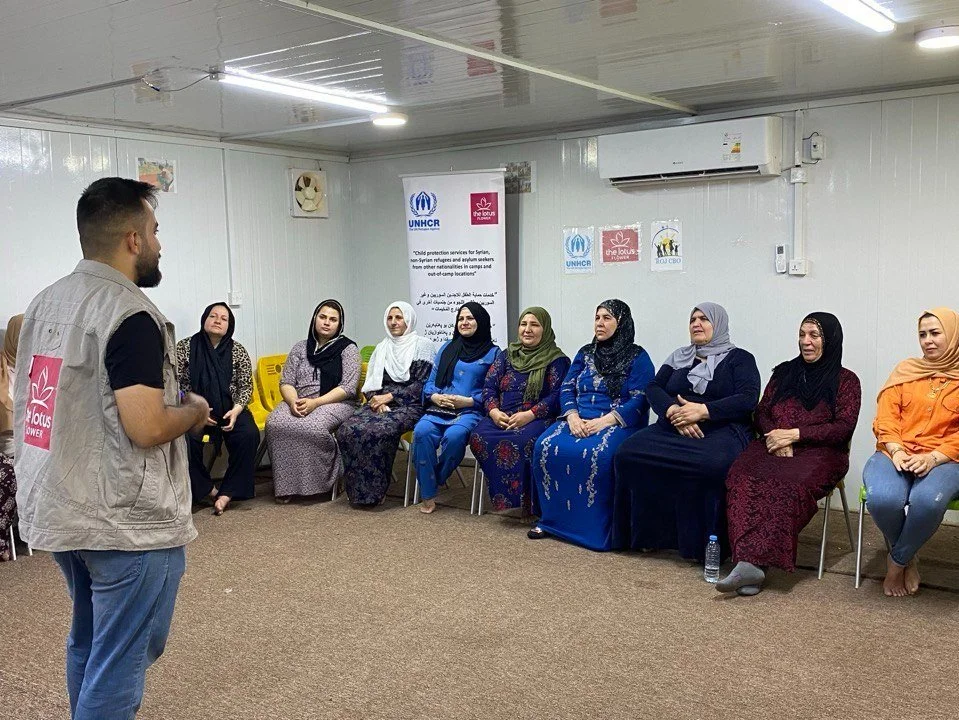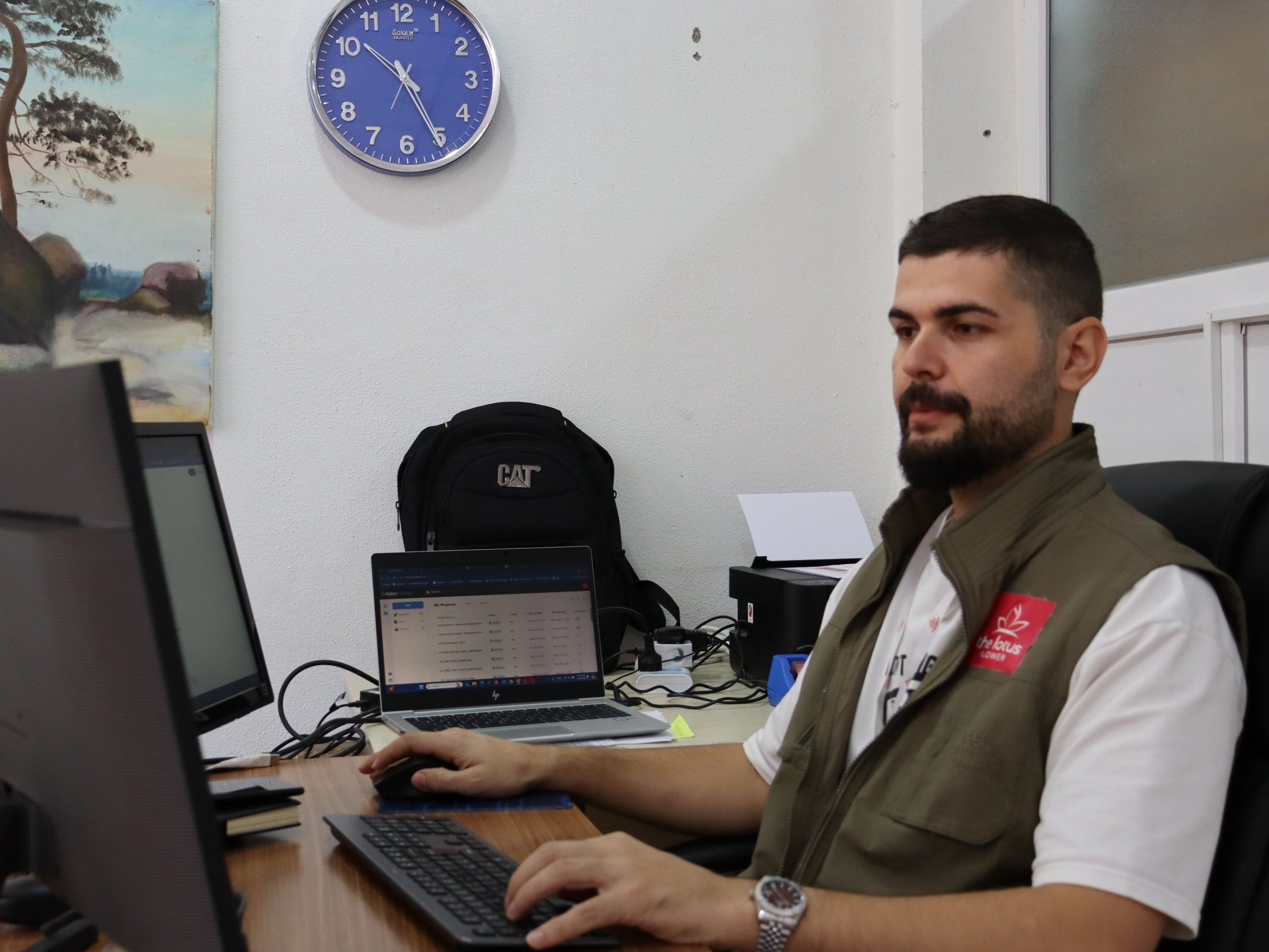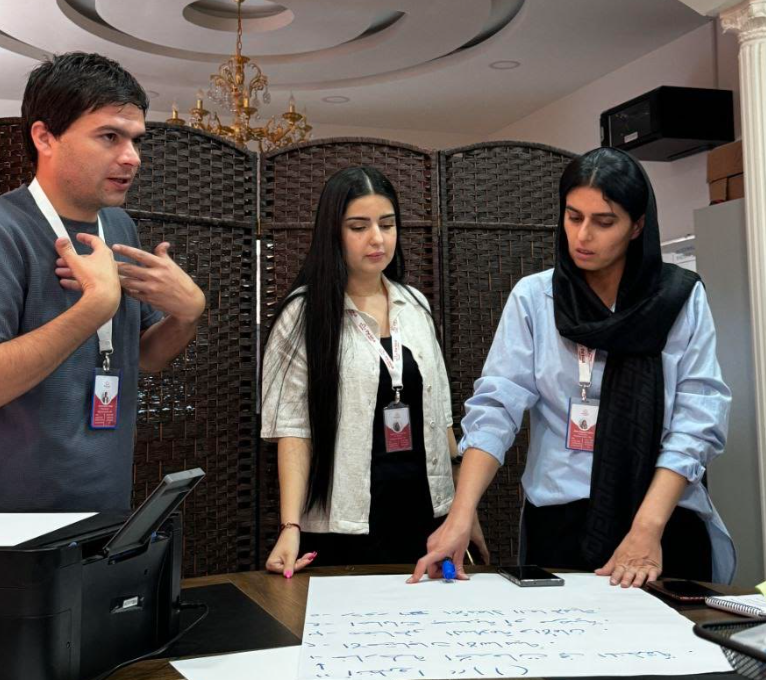International Day of Peace 2025: Turning Pledges into Action
Last week in London, our Founder & CEO Taban Shoresh spoke at the Peace is All of Us Summit for the International Day of Peace, reminding global leaders of a simple but urgent truth:
“Peace may look different across our stories, our cultures, and our generations - but it should always be rooted in one truth: peace is lived, not imagined.”
At The Lotus Flower, we are proud to be living this commitment through the opening of our new Women, Peace & Security Centre (WPS), in Kurdistan, Iraq.
The Centre will be marking its official opening this week on Thursday, 2nd October. Born out of our pledge made at the Global Refugee Forum, the pledge was made in partnership with the Action Network on Forced Displacement, the German Federal Ministry for Economic Cooperation and Development (BMZ), the UN Women’s Peace & Humanitarian Fund (WPHF), New Women Connectors, and the IDP Women Association Consent.
Together, we pledged to advance displaced women’s participation and leadership in peacebuilding and decision-making.
Now, that pledge has become reality. Since opening its doors, the WPS Centre has already:
Trained 110 Peace Sisters & Brothers (74 women, 36 men) in mediation, conflict resolution, and gender equality
Begun youth-focused soft skills programmes in critical thinking, leadership, and communication
Hosted the first of eight stakeholder workshops to raise awareness of UNSCR1325 with NGOs and government representatives
Established new partnerships with the University of Duhok’s Peace & Conflict Resolution Centre, with joint research now underway on women’s leadership in the Kurdistan Region’s security sector
Crucially, the Peace Centre is a safe space run by women, for women - a place for grassroots leadership, cross-cultural dialogue, and peacebuilding initiatives that bring together displaced communities, host societies, and young people.
In a world where conflict and displacement is rising, we need peace now more than ever before. As Taban reminded us in her speech at the Peace Summit:
“We cannot build peace on foundations of occupation, displacement, militarisation, and inequality. Transforming peace requires courage to confront injustice, even when it is uncomfortable. Women have the transformative power of leadership in peacemaking, so we must include them at every stage.”
This month, as we celebrate the official opening of the WPS Centre, we recommit to the mission: to ensure that peace is not imagined, but lived.
#InternationalPeaceDay #GRF #RefugeeVoices #WomensLeadership #PeaceCentre #TheLotusFlower #PeaceBuilding
From boxing to skateboarding: how our sporting programmes are breaking barriers in displaced communities
"Some of these girls were born in the camp, they've never known life beyond its fences. For them, the idea of skating was something entirely new, almost unimaginable. But once they stepped onto the board, everything changed. While skating, they felt free, unburdened, and confident. This is more than just sport; it is liberation."
These words from our Project Manager, Hassan, capture the profound work taking place at The Lotus Flower centre in Rwanga Camp, a settlement for displaced families who have been forced to flee regional conflict in the Kurdistan Region of Iraq.
In the centre we run our Skating Sisters programme for girls aged between 10-16, and our Boxing Sisters programme for women aged between 16 - 35. What started out as community-created initiatives have become a powerful testament to the ways sport can transform lives in displacement settings. The programmes not only help the girls to develop life skills like teamwork and leadership, but they are also transcending cultural boundaries.
In settings where girls face gender-based discrimination, sport has an amazing ability to break down barriers. As well as increasing physical activity and mental wellbeing, these programmes serve as a trusted entry point for social change by opening up conversations about gender equality, access to education, and leadership opportunities.
In the words of our boxing and skating trainer, Nadifa: “We aren’t just teaching a sport. We are challenging a mindset.”
Boxing Sisters Programme - Rwanga Camp
At The Lotus Flower centre, our ongoing programmes like Boxing Sisters teach girls how to defend themselves and command space. Young women and girls have the chance to step into a space once reserved for men and boys and make it their own. For many, the punching bag is a release from the trauma they have experienced and a channel for building confidence. Groups gather to train together, building both physical resilience and friendship. They discover not only how to throw a punch, but also how to stand tall, claim space, and support one another
Our pioneering Skating Sisters is another programme that is supporting girls to grow in self-belief, resilience, and balance. Launched in partnership with Skateistan earlier this year, Skating Sisters brought the first-ever skateboard ramp to the Duhok region, offering skating training for girls in Rwanga Camp.
What was initially planned for 40 participants quickly expanded to 60, as girls queued behind the fences, eager to join. Today, three groups - Jasmine, Butterfly, and Hope (names chosen by the girls themselves) - gather weekly at our purpose-built ramp to practice, play, and build lasting friendships.
"This is more than just sport; it is liberation," reflects Hassan. "Boards can carry more than tricks. They carry hope, solidarity, and the promise of new possibilities for these girls."
Despite barriers like lack of experience and limited community support, we find that participation dramatically enhances psychological wellbeing and is helping the girls navigate the complex challenges of displacement.
Find out more:
If you would like to find out more, we invite you to watch our Skating Sisters documentary here. We were thrilled to premiere the film at this year’s Battle of Hastings International BMX festival in partnership with Source Park.
You can also listen to a BBC radio documentary on our Boxing Sisters here.
Follow our journey on Instagram @thelotusf and discover more about our work at www.thelotusflower.org.
The Lotus Flower partners with medica mondiale to combat new threats to child marriage protection
Joint report reveals urgent risks as legal marriage age for girls could drop to as young as nine years-old.
When Iraq’s Personal Status Law amendments were passed in January 2025, allowing marriage for girls as young as nine and stripping away critical protections for women, The Lotus Flower immediately mobilised a response across the Kurdistan Region of Iraq, in partnership with medica mondiale.
The Personal Status Law in Iraq governs marriage, divorce, inheritance, and family matters, directly determining the legal protections available to women and girls. These recent amendments to the law pose unprecedented threats to existing safeguards that help prevent child marriage and protect women’s fundamental rights.
Recognising the profound risks of this law change, our initiative combined urgent community awareness with strategic advocacy. Within weeks, we reached nearly 400 community members and 60 key stakeholders through awareness-raising workshops held in Duhok and Zakho. These sessions fostered dialogue and collective analysis around the impact of the law change, laying the groundwork for informed action at both community and policy levels.
Key findings from our report reveal:
Marriage age lowered to nine years-old violates international law
Allowing marriage for girls as young as nine years-old is a direct violation of Iraq’s Constitution and the Convention on the Rights of the Child, and carries severe health risks, educational disruption, and psychological trauma for girls.Women systematically stripped of legal rights
The amendments now exclude wives from inheriting land or property, and automatically transfer custody of children to fathers from the age of two years-old. Additionally the law permits polygamy without the first wife’s consent, institutionalising gender inequality across all areas of family law.Vulnerable communities face compounded dangers
The reforms disproportionately affect displaced families, female-headed households, and children in IDP camps. Poverty, child trafficking, and homelessness will likely be exacerbated. Vulnerable groups, including orphans and children living with elderly caregivers, also face compounded risks.
At The Lotus Flower, we remain committed to amplifying women’s voices, defending their rights, and ensuring that protection frameworks are not eroded in the face of regressive policies. Our partnership with medica mondiale reinforces the urgent need for local, national, and international solidarity to safeguard the futures of these girls and women in the region.
As one of our longstanding, trusted partners in northern Iraq, medica mondiale brings deep expertise in psychosocial support, legal assistance, and advocacy for women and girls affected by violence.
Swimming Sisters: building confidence and community in Hastings
by Bryony Michaelson, Programme Manager (UK)
In 2024 we proudly launched Swimming Sisters, our first UK-based programme, in Hastings, East Sussex. This initiative was created to support women who have previously faced barriers in accessing swimming. Our goal? To help them overcome fears, build confidence and find community and connection.
We take a holistic approach in all our programmes, both in the UK and in Kurdistan, Iraq, combining mental health support with opportunities for learning and growth. Swimming Sisters has been running successfully in Kurdistan and thanks to the generous support of our partners, Ancient + Brave, we have been able to bring the programme to the UK.
Swimming Sisters has always been about much more than learning how to swim. It also offers a vital space for self-care, wellbeing, and community. Women are discovering the joy of ‘me time’, finding moments of peace away from their daily responsibilities. Many participants have described the sessions as the only time they can truly focus on themselves. For newcomers to the local area, the programme has also created a welcoming community and a safe space to connect with other women.
Beyond mental and social well-being, the participants are also benefiting from improvements to their physical health. Several joined the programme on the advice of their healthcare providers and are noting significant progress in health and stamina.
We are always led by the needs of the community and much of our work at The Lotus Flower is about breaking down barriers. This means there will always be challenges to overcome. For the Swimming Sisters programme, this included the challenge of finding women-only spaces, which are limited, and navigating generational or cultural attitudes that can discourage women from swimming. Creating a safe, inclusive, and culturally sensitive environment has been central to the growth of this programme and community.
Speaking to our Swimming Sisters, the benefits are clear! The women are reporting greater confidence at home and life more widely - whether joining family water activities, feeling safe on holiday, or simply enjoying being near the water. One participant shared the joy of being able to take her children swimming - an activity she had previously avoided due to her fear of water. Another recounted how proud she felt taking her grandchildren to a public pool for the first time.
Our ‘Sisters’ lunches have become a standing date in the diary, where each member brings a delicious dish! And we are finding that these meet-ups are really strengthening bonds within the group, as well as reducing isolation.
In the words of our Swimming Sisters co-ordinator, Celeste:
"It has been lovely to see the Swimming Sisters community flourish. The group started as strangers, but over the weeks friendships are forming and there is a great sense of team spirit among the women. If one woman is struggling with something in the pool, there’s only a second before someone steps forward to help or encourage. The group have expressed how empowering it feels to gain confidence in something they didn’t think they could do."
What is next for Swimming Sisters? Looking ahead, we are excited to share that a group of Swimming Sisters will be taking part in a sea safety workshop on the Hastings shoreline. This is taking place in partnership with the Clean Water Action Group. For many, this will be the first time they approach the sea, offering an opportunity to learn about tide patterns, safety, and even dip a toe in the water if they wish!
Meet Haifa, from displacement to serving communities
In 2022, our Lotus team visited Derabon village, an informal settlement where many IDPs live, to conduct an assessment. There they met Haifa, an active community member aware of the needs and challenges in Derabon. She joined the Lotus Flower first as a community mobiliser, and she now works as a caseworker for our General Protection project with CARE Iraq and ECHO in our Sharia District Centre.
Originally from Khanasor, Sinjar. Haifa, our caseworker, tells her story of displacement and resilience. “We never believed the threats of ISIS until our relatives from Qiblat [south of Sinjar] fled to our house; their son was already captured by ISIS. There I felt the real danger.”
Her family, like many others, used to be farmers of okra, tomatoes, cucumbers, and onions. “We used to farm in all seasons,” she said.
“We had two cars, but only my uncle’s car had enough fuel to make it to the Kurdistan region. Our car didn’t have enough fuel and would only get us as far as some Arab villages, like Rabi’a, before running out. That area was extremely dangerous at the time, so we made the difficult decision to escape to Sinjar Mountain instead.”
Haifa tells us a story about her childhood friend, whom she shared the same desk for six years. “She was captured by ISIS along with 62 members of her family. Ten years have passed since then, and we still have no information about her fate or what happened to her.”
In 2022, when our team visited Derabon village [an informal settlement that many IDPs live in] to conduct an assessment, Haifa met our team; she was an active girl and aware of the community’s needs and challenges, having lived there for nine years. She soon started to work with us as a community mobilizer. Now, three years later, she works as a caseworker for our General Protection project with CARE Iraq and ECHO in our Sharia District Centre.
“I live in Bajd Kandala IDP camp, which is an hour away from my workplace, but the passion I feel makes me happy to come here every day.”
“I work not just for my family but for the cases I handle and the vulnerable communities who depend on and wait for our services.” Haifa says.
Haifa talks about her work and says, “There are times that my cases refuse to see a psychotherapist; a skilled caseworker needs to gently convince them for their best interest.” Haifa has significantly impacted the lives of women: "I have seen women who have struggled with mental health issues and have attempted self-harm." “We provided case management services and referred her to our psychologist; now, after 4 months, she has overcome those struggles and started her own business.”
Haifa mentions that her work with The Lotus Flower helped her both financially and mentally. “The income I had from work was the reason my siblings continued their education.” She hopes that one day she can also continue her education and own her private business.
Despite work, Haifa enjoys travelling and enjoying life in nature!
Celebrating our Cash for Work project in Erbil
In January, our team participated in a workshop to mark the end of our Cash for Work project with GIZ Iraq. The EPSI Collaboration (Employment Prospects for Socioeconomic Integration) and Networking Forum in Erbil gathered partners to review outcomes, exchange insights, and plan for the project's future sustainability.
The workshop opened with a welcoming speech from EPSI Head of Programme, Gina. As one of the six implementing partners, we were invited to share our contributions, best practices, and lessons learned. The discussions enabled us to share valuable insights around community engagement strategies and to explore practical suggestions, such as capacity-building workshops to enhance long-term impact.
Overall, the forum was a productive and collaborative platform for all partners to come together and work towards a common goal of promoting socioeconomic integration through improved employment prospects. The event highlighted the importance of ongoing collaboration and knowledge-sharing among organizations working towards similar objectives. Moving forward, we are excited to continue our partnership with EPSI and other stakeholders to further strengthen our impact and support the sustainable development of the community.
We are proud to have contributed to this successful collaboration.
We commemorated 16 days of activism to end GBV in Duhok, Zakho, and Erbil!
During 16 days of activism to end GBV, we held events with local government, academic institutions, NGOs, and INGOs in Duhok Governorate, Zakho Independent Administration, and Erbil Governorate!
The Directorate of Combating Violence Against Women and Families (DCVAW), which collaborated with local and international NGOs, including The Lotus Flower, to plan the opening event, hosted the first event in Duhok on November 25. The Mayor of Duhok, DCVAW Director, representative of Nawroz University President, Duhok Police, UN representatives, and GBV-Cluster participants from Duhok were attendees.
This gathering focused on important advocacy elements like programs empowering survivors and educating the community, showcasing the joint work of the government and NGOs to address gender-based violence (GBV). During the event, DCVAW acknowledged The Lotus Flower’s work as a part of the Duhok GBV cluster, highlighting our contributions and expressing their appreciation for our efforts. The DCVAW Director also emphasised the need for continued advocacy and awareness-raising efforts to prevent and respond to gender-based violence in the community.
The second event, the first-ever 16 Days of Activism in the Zakho Independent Administration. It was organised in collaboration with DCVAW-Zakho, the University of Zakho, and various local and international NGOs, including The Lotus Flower. The event featured a gallery of artworks addressing GBV and the co-production of a short film on the subject and a panel discussion. - The mayor of Zakho—representatives of the Zakho Independent Administration. The University of Zakho president - Other key stakeholders from international NGOs, including the UN and others. The Lotus Flower’s meaningful work was acknowledged and appreciated on stage during this remarkable event.
We proudly participated in the third event, which CARE Iraq jointly organised with us and which united voices to combat gender-based violence in Erbil.
The general director of DCVAW, representatives from the European Union's humanitarian aid, and numerous NGOs and INGOs were present at the event. The event had two panel discussions highlighting key issues and solutions. Our regional director, Vian, moderated one panel, while our senior case worker, Shaima, discussed the challenges IDPs face without IDs and the services we provide under the General Protection Project in partnership with CARE.
Women Committee Member Faiza also shared insights into their impactful work, and we had a side event, selling products by women entrepreneurs, and our talented music facilitators delivered a music performance.
Technology-facilitated GBV panel discussion
As part of the 16 Days of Activism Campaign, the University of Duhok’s Centre of Gender Studies, in coordination with us, High Consul for Women and Development and UN-Women, hosted a panel discussion on technology-facilitated GBV.
This event was held at the University of Duhok’s Students Centre, where we hosted students from different departments. They had a time to listen and know more about TF-GBV and its different forms. Panellists included DCVAW representatives, UoD teachers, and advisors, who shared their fruitful discussions on combating cyber abuse in the panel. students, and other attendees were keen to share their ideas and ask questions during the discussion. An impactful awareness video by us on cyber abuse was also screened, sparking meaningful dialogue among attendees.
One more event!
Our General Protection Project in partnership with CARE Iraq, funded by the European Union Humanitarian Aid, ended the 16 Days of Activism campaign to end GBV with an impactful outdoor event at the University of Duhok’s Students’ Centre.
We invited 16 inspiring women entrepreneurs to support their small businesses. The event was filled with engaging activities, including questions on GBV, a silent theatre performance, an art gallery addressing GBV, and an incredible music performance.
We also screened awareness videos on cyber safety and the importance of education for girls, produced by CARE Iraq. Together, we raised our voices for change and promoted a future free from gender-based violence.
Meet Dunya, our General Protection Project Manager "I enjoy working with the team to find creative solutions to new challenges."
Dunya, a dedicated advocate working on the General Protection project. In partnership with CARE Iraq, funded by European Union Humanitarian Aid, which increases access to essential services for internally displaced people (IDPs) in Duhok Governorate. She says, "My father suffered arrest and torture by the Ba'ath Party. Those experiences shape my drive to help others."
Dunya, on the left with a delegation from CARE Iraq
In 2015, Dunya began her humanitarian aid journey and joined Lotus Flower in February 2024 as a project assistant. Within just three months, she was promoted to project manager within the same project. "The Lotus Flower promoted me to project manager, recognising my qualifications. It reminded me of the quote, 'Opportunities don't happen; you create them.’ She says.
With a degree in science in the biology department, Dunya hadn’t always envisioned working in humanitarian aid. However, after the crisis in 2014 and many people seeking refuge in the Kurdistan Region areas, she became passionate about making a difference. Now, as project manager, she leads a general protection project in partnership with CARE Iraq. Her dedication to transforming lives through increased access to services fuels her passion for her work, as she says, "True leadership is fuelled by a passion for making a difference."
Dunya finds the most rewarding aspect of her job is seeing the direct impact her work has on the lives of IDPs. She loves collaborating with her team to overcome challenges and appreciates the continuous learning her role offers. One thing many may not realise about her job is how essential relationship-building is. Dunya spends significant time getting to know the communities she works with, which helps shape programs that truly meet their needs. She reflects on a quote that guides her approach: “People will forget what you said, people will forget what you did, but people will never forget how you made them feel.”
The strong team spirit at The Lotus Flower is another highlight of her role. "Everyone supports each other, creating a positive and collaborative work environment." She said.
"It's motivating to be part of a team that values cooperation and shared goals."
In the very beginning of her journey, there were misconceptions about gender-based violence. Dunya shares the story of a woman who once walked out of a GBV awareness session, claiming the information would turn women against their men. Later, the same woman returned to the centre, saying, “I remembered what you said in that seminar. I’m experiencing domestic violence, and I need support.”
Dunya, during a women’s safe space session
Dunya’s work has not only benefitted the communities she serves but has also contributed to her own personal growth over the past eight years. Looking ahead, she hopes to continue making meaningful change and to build a stronger, more supportive community. During her free time, Dunya finds enjoyment in travelling to explore diverse cultures and participating in agriculture.
We are happy to have you on the team!
Meet Our Child Protection Officer, Mohammed Ali: “Seeing the positive changes in children’s lives is the best part of my job.”
Meet Mohammed Ali, our dedicated Child Protection Officer, collaborating with UNHCR to bring a personal touch to conflict resolution in his work. “I was just three years old when my family and I were internally displaced due to fears of bombings in our city. My grandfather, a well-known Peshmarga, was wanted by Iraq, which led my family to seek refuge in Iran.”
Mohammed's journey to The Lotus Flower began when he was a volunteer for two years in NGOs. “I heard about a small NGO that has done outstanding work; they coordinated with many other NGOs, including the one I worked with. He joined The Lotus Flower in July 2022;
“The Lotus Flower appreciated my volunteering experience and hired me.”
Mohammed holds a degree from the College of Basic Education, English Department, at the University of Duhok. In his current role, he works on the child protection project in collaboration with UNHCR, delivering essential services in refugee camps and urban areas across Duhok Governorate, including locations such as Zakho, Batifa, Akre, Daratoo, Amedi, Khrab Babke, and their suburbs. The project extends its reach beyond camps, also providing services in areas such as Batifa, Akre, Daratoo, Amedi, Khrab Babke, and their suburbs.
“My work involves providing transformative services for children, whether they are recreational, educational, or protective,” Mohammed shares.
An aspect of his position that may not be widely recognised involves empowering refugees in areas outside of camps to participate in awareness campaigns and initiatives. Mohammed also supports government entities in integrating child protection practices, enhancing their staff's knowledge and skills, and establishing a pool of trainers within each entity to address internal gaps and challenges.
“One woman participant in our parenting skills programme had protection concerns for her child. The Lotus Flower provided the necessary support, and she then became involved in community outreach as a volunteer. Eventually, she participated in our Cash for Work project and secured a job with another NGO!”
In a reflection on his journey, Mohammed shares, 'Starting from an entry-level position, I now lead an important aspect of one of our largest projects at The Lotus Flower.' Looking back to 2022, I am grateful for how far I’ve come and excited to see where my career will take me next.”
In the future, Mohammed hopes to help build a community with the capacity and resilience to address protection concerns. Outside of work, he enjoys football and is a passionate coffee lover, showcasing his expertise in brewing espresso, latte art, and creating unique coffee blends!
Support the Lotus Flower’s "Rise and Thrive" Campaign: Your Donation and Impact Doubled This Week through Big Give!
We are thrilled to announce that the Lotus Flower will be launching an exciting new project – Rise and Thrive – and we need your help!
Thanks to the extremely generous support of the Big Give Women and Girls Match Fund, if we raise £5000 they will match every pound up to £5000! Bringing us to our total target amount of £10,000. Make any size donation between 10th - 17th October and the impact will be doubled, helping us empower under-represented women and girls in East Sussex.
What is Rise and Thrive?
Rise and Thrive is designed to help local women and girls who struggle to access stable employment or grow their businesses. Through tailored workshops at our central hub in Hastings, participants will receive job-readiness training, career support, and business growth skills. These opportunities will help participants gain confidence, secure jobs, and contribute to the local economy.
Our goals are to:
Provide job-readiness skills to participants, boosting their confidence and employability.
Support local businesses by connecting them with skilled workers from our community.
Create a community-led ecosystem that fosters economic self-sufficiency.
Encourage long-term growth through job placements, resilience-building, and collaboration.
In the short term, we aim to empower women and girls to take control of their futures by offering them access to skills, resources, and networks. In the long term, this project will reduce unemployment, stimulate local business growth, and lead to more engaged, thriving communities.
How Can You Help?
We need to raise £5,000 in the next 7 days to meet our £10,000 goal. By donating during the campaign window, your contribution will be matched by Big Give, meaning your impact is immediately doubled. This match-funding initiative is a fantastic way to amplify your generosity. No amount is too small - every donation counts towards transforming lives.
For example:
A £20 donation becomes £40
A £50 donation becomes £100
A £1000 donation becomes £2000!
The Campaign Details:
Dates: 10th October - 17th October 2024
Match Funding: every donation will be doubled during this period.
How to Donate: Click here to donate! (Live from 12pm on 10th October)
We are incredibly excited to get the Rise and Thrive project off the ground, and we are so grateful for your support. Whether you can give £10 or £100, your donation will go twice as far this week to help us uplift women and empower our community.
Thank you for standing with us!
The Lotus Flower team
Our new livelihood project is live in Sinjar
We are happy to announce the launch of our latest project, the Women’s Business Incubator Project in Sinone, Sinjar district, implemented by The Lotus Flower in partnership with SEZ and funded through the federal state of Baden-Württemberg.
This project aims to empower 100 women and girls from the Sinjar district by equipping them with essential skills such as financial management, marketing strategies, and business development knowledge. Over a three-day period, the participants will gain key abilities to help them open and successfully manage their own businesses. This training aims to foster financial independence and entrepreneurial confidence among the women, creating opportunities in a region recovering from significant challenges.
After the training, 24 women and girls with strong business plans, evaluated based on their feasibility and impact, will receive financial grants to establish or expand their businesses. These grants are aimed at supporting various business projects that contribute to promoting sustainable development within the community.
The primary goal of this project is to empower women and girls in Sinjar by equipping them with the necessary tools to become independent business owners and decision-makers, fostering a future where they lead sustainable businesses and drive economic growth in the region. By providing financial support for their businesses and professional growth, we aim to help build a future where they not only succeed as entrepreneurs but also emerge as influential leaders within their communities, driving sustainable development and lasting change.
We’re excited to see the positive changes this project will have on the women and girls of Sinjar. Join us in supporting their inspiring journeys towards financial independence and leadership by staying updated on our progress and getting involved in our initiatives.
Meet Our M&E Officer Issa: “They encourage staff here to share their ideas”
Issa, an M&E Officer at The Lotus Flower. He and his family were impacted by the conflict, being an 8-month-old infant, in 1991 and were displaced to the city of Dashtan in Turkey. He says, “ I’ve been told that my grandmother was holding me on her lap in a salon car, my milk was distributed among family members so I don’t die from hunger.”
“The conflict also affected my father, who was looking after our family as well as my uncle's. Because the Iranian regime arrested my uncle after he was forced to fight in the Iraqi-Iranian War by the Iraqi government.”
Issa, now 34, graduated from the Computer Science Department at the University of Duhok and is working at The Lotus Flower. "I had heard about The Lotus Flower but wasn’t aware of their work. After a sports-related knee injury forced me to leave my previous job, I planned to take a few months off to rest. However, many of my friends spoke highly of The Lotus Flower’s healthy and friendly environment, so I decided to apply. Within a week, I moved to my new role at The Lotus Flower."
Issa’s primary work location is The Lotus Flower office in Duhok, but he also occasionally visits all of the centres and implementation sites. “I am working for all of the projects; sometimes it depends on the project, like how big it is and how much time it will take, but I work for all of them.”
“The best thing about my job is my colleagues, especially the ones working with me directly, Muslim and Vian.” Says Issa.
Issa values the trust and support he receives at The Lotus Flower. “They encourage staff here to share their ideas; there is a lot of trust between them and their staff, and they are always looking for ways for improvement. They really value the skills of their staff members.”
Issa finds comfort when supporting others; he mentions that his nice memories are “Some of the volunteers that worked with us were very intelligent and skilled, and I helped them get jobs by giving them orientations and advice; they have secured great jobs now!”.
Issa plans to work for The Lotus Flower until his retirement. “I want to work here until I retire and enjoy a simple life with my family." Outside work, he enjoys practising his hobbies: singing, playing guitar, football, and calligraphy.
A proposed law change in Iraq may allow girls as young as nine to marry
The Lotus Flower is shocked and appalled by proposed amendments to the Personal Status law in Iraq, which could effectively legalise child marriage for girls as young as nine years old.
A formal proposal to change the 1959 Personal Status Law of Iraq was made in Iraqi parliament on August 4. The amendment would put young girls at risk of early marriage, which could detrimentally affect their education, health and wellbeing. Moreover, the proposed amendment seeks to empower religious authorities in other family matters, potentially undermining legal protections that shield women and girls from forced marriage, restricted inheritance rights, and discriminatory treatment within the legal system.
The approval of this amendment could reverse the strides made in women's rights over the years, jeopardising advancements in education, employment and the autonomy of women. Furthermore, it would lead to disjointed legal structures for diverse religious groups, exacerbating existing societal rifts.
The Lotus Flower has been wholly committed to protecting women and girls' rights since we began in 2016, but as our Founder and CEO Taban says of the law amendment: “If pushed through it would have devastating impacts on the lives of girls, women and women's rights organisations in the region… It makes our work so much harder and more dangerous.”
As an organisation, we have been working tirelessly at grassroots level with women, girls, men and boys, plus religious leaders and government bodies to enhance protection for women and girls, and Taban stresses: “We do not want our work to be undone.”
In a video appeal posted here on social media, she adds: “We need to ensure that we protect the lives of women and girls in the region. Girls have a right to education and safety, but most of all to experience their childhood.” Taban also shares more on the context in this video.
In response to the amendment, widespread protests have erupted throughout Iraq, with citizens and advocacy groups voicing concerns over the future of women's and children's rights in the nation. These demonstrations underscore the risk of diminishing legal safeguards, heightened vulnerabilities, and a decline in the status of women and children.
The Lotus Flower is dedicated to creating safer, more just environments for the most vulnerable. Our key Child Protection Project funded by UNHCR operates in camp and non-camp areas across Duhok Governorate and Zakho, and focuses on providing support and safety to children affected by conflict. Meanwhile, our General Protection project with Care International and ECHO provides support and awareness for vulnerable women, girls and children. And our seven women’s centres offer awareness, workshops and community outreach to raise awareness on critical protection topics.
“The amendment to the Iraq Personal Law will unfortunately undo decades of progress on gender equality and women’s rights in Iraq,” says our Regional Director Vian Ahmed.
“The lives of thousands of Iraqi women and girls will be under threat when better facilitation is given for child marriage, restricting women’s rights in divorce and custody in addition to making polygamy easier to practice.”
With our interventions based on community needs, our Protection monitors work within different communities to raise early marriage as a major protection concern. The amendment to the Personal Status Law will accelerate such concerns, so it’s fundamentally important that women's rights, children's rights NGOs , government entities, as well as politicians who support human rights stand firmly against this law change.
We are working closely with other organisations and women’s right groups in Iraq to make our voices heard, and greatly need support to share our message and urge the Iraqi government to refuse the amendment. We desperately need to ensure that safeguarding women and girls’ rights is an immediate priority, and that any legal reform moves toward gender equality, rather than away from it.
Thank you for your support.
The shock rise in violence against women and girls in England and Wales
Alarming new data has revealed that violence against women and girls in England and Wales has soared by nearly 40% over the past five years, with two million estimated to be affected every year.
The increase of 37% has been described as a "national emergency" by senior police officials, and has prompted calls for urgent action.
The figures have been revealed in the first national analysis of the scale of violence against women and girls (VAWG) by the National Police Chiefs’ Council (NPCC). They show that incidents including stalking, harassment, sexual assault and domestic violence now account for roughly 20% of recorded crimes in England and Wales.
The rise in violence has been attributed to a combination of factors, including misogynistic online content, the failure of existing systems to protect women and the rise of young men being radicalised.
Specific environments, such as public transport, have seen a dramatic rise in violence, with attacks and assaults on women on railways more than doubling since 2021, particularly during commuting hours.
What’s more, women’s advocacy groups and charities believe these figures underrepresent the true nature of the problem, as many victims do not report their experiences due to fear or lack of confidence in the criminal justice system.
The report states: “We estimate that at least one in every 12 women will be a victim of VAWG every year (2 million victims) and one in 20 adults in England and Wales will be a perpetrator of VAWG every year (2.3 million perpetrators). These are cautious estimates as we know much crime goes unreported and in policing we often only see the tip of the iceberg.”
In response, many are calling for a comprehensive overhaul of the current response to addressing violence against women and girls, including specialised policing hub and more inter-agency collaboration. The British government is also being urged to prioritise the crisis and implement more robust strategies to protect women and girls, while also bringing perpetrators to justice.
At the Lotus Flower, we are increasing our fundraising efforts so that we can urgently implement more support and projects for those in the community who most need it. Please help us if you can, by visiting our donation page here…
THE KEY STATS
Nearly 3,000 violent crimes against women and girls in England and Wales are recorded daily.
One in six homicides in England and Wales are linked to domestic abuse, or 100 out of the 590 homicides in the year to March 2023.
More than a million violent crimes against women and girls were recorded between 2022 and 2023 alone in England and Wales.
One in 12 women in England and Wales are impacted by crimes including stalking, harassment, sexual assault and domestic violence.
Child sexual abuse and exploitation increased by more than 400% between 2013 and 2022.
Violent attacks on women on UK railways have more than doubled from 7,561 incidents in 2021 to 11,357 in 2023.
More than a third of women who commute by rail have experienced some form of assault.
Domestic abuse-related arrests increased by 22% in the year ending March 2023.
On average, it takes a woman seven attempts before she can leave an abusive relationship.
It’s estimated that around three women die by suicide every week in the UK as a result of domestic abuse.
20% of children in the UK, or one in five, have lived with an adult perpetrating domestic abuse.
Around 41% of girls in the UK aged 14-17 experience some form of sexual violence from their partner.
93% of defendants in domestic abuse cases are male; 84% of victims are female.
The findings of our post-Covid 19 needs assessment
In May this year, our team conducted a needs assessment to identify the true impacts of Covid-19 on the vulnerable populations we support. We recently published the findings from the report, which included the following results:
· A 50% increase in reported cases of gender-based violence among respondents, including verbal, physical and financial violence.
· 82% of respondents reported psychological problems related to the pandemic, with anxiety disorders being especially prevalent.
· 97% of respondents reported being financially affected, with 151 individuals saying that they had to sell their car or furniture to cope.
· 398 respondents reported losing their primary source of income.
· 793 respondents noted increased levels of debt.
· 48 respondents reported the loss of a small business.
The assessment was conducted as part of our three-year project with UN Trust Fund to End Violence against Women, which included mass awareness-raising of gender-based violence and mental health support and case management services for victims. It also delivered women’s small business training, enabling beneficiaries to earn incomes for themselves and become community leaders
You can read the report in full here.
Take part in our new Coding Sisters project
We recently ran a Coding Sisters project with UNHCR Iraq, which taught women and girls essential skills in computing, tech and web design.
Coding is all about creating sequences of instructions for computers, which are needed in every single thing we do in the digital world.
We’re now beginning another four-month Coding Sisters project for girls, this time from Domiz 1 and Domiz 2 camps as well as Waar City. It will take place from September to December 2024.
If you would like to apply, the registration page is here.
Please complete the form by August 25th at the very latest.
Thank you.
Meet Our Admin Assistant Shang: "I’m always excited to go to work"
Shang is an Admin Assistant at the Lotus Flower, who has personally experienced the horrifying effects of conflict. As a very young girl in 1991, she was displaced to Turkey with her family, and recalls: “My father was a doctor back then, working in displacement and curing wounded people there.”
A decade later, the family faced further displacement, and by 2003 were living in Amedi in Kurdistan. “People were fleeing again, schools stopped providing lessons and were emptied because those who fled to rural areas moved into schools due to fear of bombardment and chemical weapons,” she says.
“I remember my father teaching us how to use face masks we made with coal in case of chemical attacks in our town. He also taught us how to run to the nearest shelters quickly in case of emergency. We knew this knowledge could save our lives one day.”
Many years later, Shang studied English Literature at Duhok university, and then successfully applied to become a team leader in our Earth Sisters project. Explaining her role within the six-month project, she adds: “We provided climate-related training for women and girl IDPs, refugees, and host communities in Duhok. The special part of this project was that the participants were from a very diverse group, and those women and girls then became leaders themselves, each in her respective community.”
She was pleased to see the Earth Sisters make considerable progress as a result of the training. “I helped many women and girls enhance their skills, learn more about climate change and gender-based violence. Additionally, some of them were able to find new job opportunities.”
After Earth Sisters concluded, Shang began working as Admin Assistant with us, a role she has had since January this year. “I work with different sectors and departments within the Lotus Flower, including HR, Logistics, and Finance, doing a lot of documentation and archiving.”
She has found the role to be personally rewarding, saying: “I especially value the opportunities for self-improvement here, and when I wake up in the morning, I’m always excited to go to work.”
Shang has developed a good working relationship with senior staff members, saying: “The management team is very understanding, creating a comfortable environment. I have also acquired new technical skills and expanded my knowledge during my work. I used to approach new job opportunities with caution, but now I embrace them as chances for personal growth. Now I am confident in my ability to adapt to various roles and responsibilities, and feel prepared to tackle any challenge.”
We’re so glad to hear it!
Our livelihoods and mental health project with IF Foundation gets underway
We’re so pleased to have begun a major new project in partnership with If! Foundation, focusing on economic empowerment for displaced and vulnerable women, as well as mental health support and awareness of gender-based violence and gender equality.
Our ‘Women’s Business Incubator & Mental Health Support’ project is taking place over three years in camps as well as host communities across Duhok, and will also include a research component to provide insights on rising cases of youth suicide and severe mental health disorders, the effectiveness of prevention strategies and gaps in support.
Building on the success of our existing, award-winning Women’s Business Incubator, the project will deliver livelihoods training and financial grants for 120 women over three years, enabling them to start their own sustainable small businesses.
Young women and men who have experienced trauma will also receive mental health and suicide prevention support, and take part in creative therapies. Older women with chronic illnesses and disabilities will benefit from psychological and holistic therapy such as yoga and meditation, while awareness-raising of GBV and protection issues will reach thousands in the community.
To mark the start of the project, we have spent the past few weeks focusing on building and developing the capacity of project staff, who will deliver mental health services including individual and group mental health support, plus art and music therapy and awareness-raising.
The training has covered a range of topics, including specialised sessions for the psychologists in aspects such as case identification and referrals, psychological first aid, professionalism at work, report writing, PSEA, code of conduct, safeguarding and protection principles, counselling skills, case diagnosis and NET therapy. Such intensive training helps us ensure high quality and ethical service delivery for vulnerable people.
It’s been a busy time, as you can see, and we’re so excited to be up and running with this much-needed intervention. We’ll certainly keep you updated on our progress over the coming months!
Apply to take part in our new Earth Sisters project
The Lotus Flower is soon to begin the second round of our successful Earth Sisters project.
With support from the German Federal Foreign Office through the German Consulate General in Erbil, the project will be focused in Zakho city, and aims to upskill and enhance the capacity of women and girls on pressing climate change issues.
The project will also address the correlation between gender-based violence (GBV) and climate impacts, and it will include initiatives led by the Earth Sisters to raise community awareness about urgent environmental issues.
If you wish to be an Earth Sister and participate in our training sessions as well as lead climate change and GBV-related initiatives in Zakho city (depending on the availability of funds), please complete the application form below.
Please note that this opportunity is solely for female applicants.
If you are interested in taking part, please apply as soon as possible here.
Our CEO Taban honoured at GQ Heroes 2024
Our Founder and CEO Taban was thrilled to be honoured at the GQ Heroes event at Soho Farmhouse in Oxfordshire recently.
Hosted by British GQ and BMW UK, the event brought together a range of international speakers and guests to exchange ideas around culture, style, business and politics, with the two-day schedule crammed with inspiring talks, round tables and performances.
In recognition of being named one of the magazine’s Heroes for 2024, Taban was interviewed by longtime friend and advocate Josie Naughton, the CEO of Choose Love, which is one of the Lotus Flower’s key supporters.
During their talk before a packed auditorium, Taban recounted her story as a child genocide survivor, powerfully describing her experience of fleeing persecution and being a political prisoner at the age of just four.
Referring to an old photo of herself on the screen above, she added: “By this point, I’d seen what it was like to be in a prison, I’d seen what it was like to see your family members cry, scream, wail and beg soldiers not to kill them. I’d seen them scream at the diggers in front of the buses because we were going to be buried alive.”
Taban also told how of her decision to give up her city job in London to return to Kurdistan as an aid worker during the ISIS attacks in her homeland. “By the time I came back after 15 months, I’m sure you can imagine I couldn’t go back to a normal job,” she said. “There was no way that I could go back to a 9-to-5.”
“So I set up the Lotus Flower with zero money on my own, and today it’s just flourished into an amazing organisation. I’ve got 200 staff in Iraq implementing projects, and seven in the UK. We’ve gone from zero to impacting on 84,000 women, girls and community members directly.”
Other speakers at this year’s GQ Heroes included Hollywood actors Russell Crowe, Emma Corrin, Joseph Quinn and Anya Taylor-Joy, as well as footballing legend Ian Wright, F1 star Jenson Button, campaigner Esther Ghey and paediatrician Seema Jilani, whose incredible work with children has taken her to conflict zones including Afghanistan, Iraq, the Balkans, Sudan, Gaza and the West Bank.
There was also musical performances from DJ Charli XCX, Jordan Rakei and Rachel Chinouriri, and loads of brilliant opportunities for building connections and starting important conversations.
Thank you so much to everyone at GQ and BMW for allowing the Lotus Flower to be part of such a special event – we hope to be able to return next year with updates on our growing impact!

